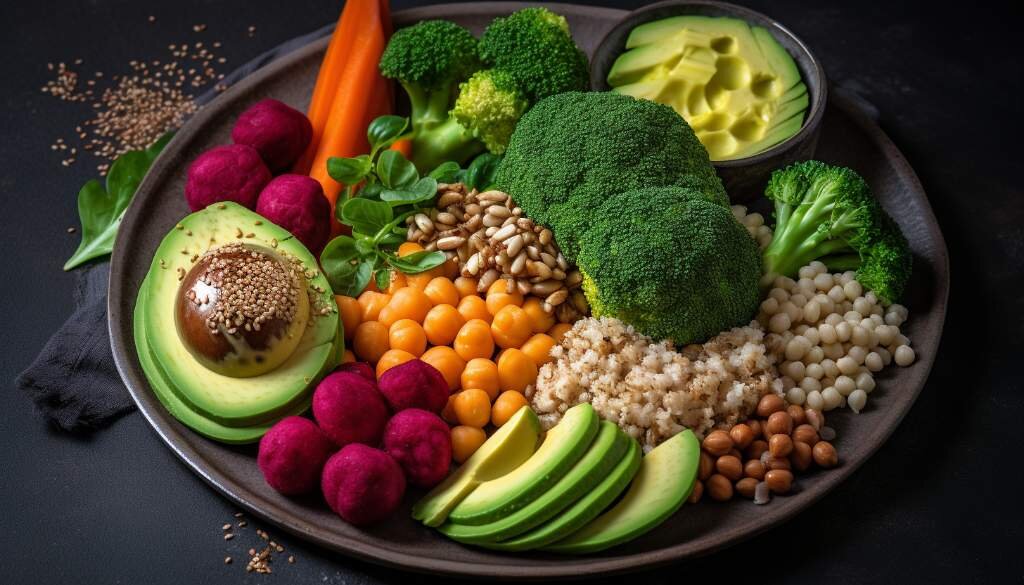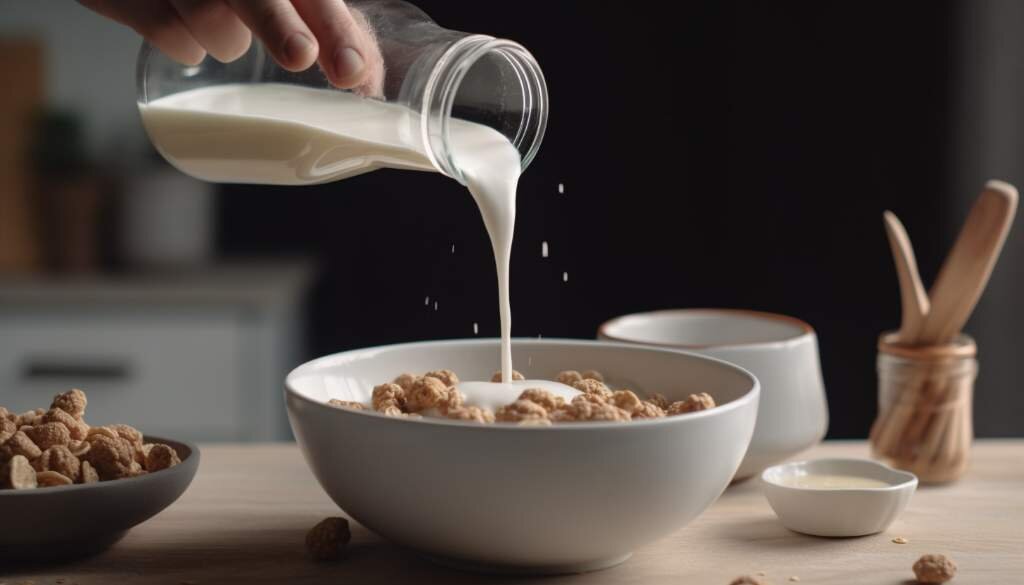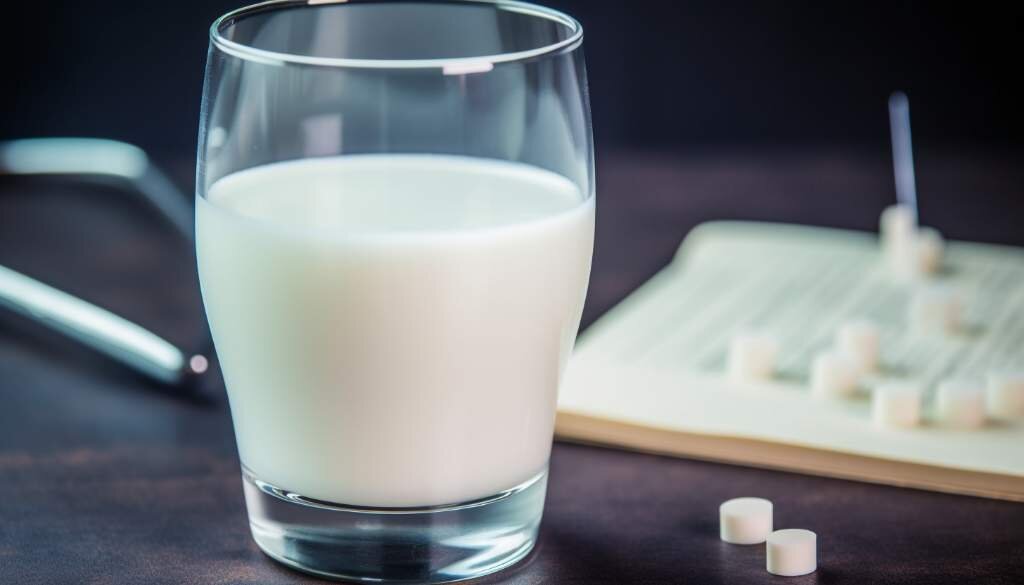
Introduction
Testosterone is an important hormone that plays a significant role in the development and maintenance of various functions in the body. It is primarily known as the male sex hormone, although it also exists in smaller amounts in females. Understanding the factors that influence testosterone levels is crucial for both men and women.

What is Testosterone
Testosterone is a hormone that plays a crucial role in the development and functioning of the human body, particularly in males. It belongs to a group of hormones called androgens, which are responsible for the development of male characteristics during puberty and the maintenance of male reproductive tissues and functions.
In this section, we will explore various aspects related to testosterone and its impact on the body. We will delve into the definition of testosterone and its functions, as well as the different levels found in men and women. Additionally, we will discuss the connection between testosterone and dairy products, exploring the potential effects of dairy consumption on testosterone levels.
Furthermore, we will examine studies conducted on the relationship between dairy consumption and testosterone levels, noting any conflicting results and potential reasons for these discrepancies. Understanding the effect of dairy products on testosterone production is crucial, so we will dive into the potential mechanisms of action and the idea of dairy products as endocrine disruptors.
To provide a comprehensive understanding of the factors influencing testosterone levels, we will also explore other dietary and lifestyle factors that can impact testosterone production. Additionally, we will discuss milk alternatives and vegan foods that may help regulate testosterone levels for those who choose to avoid dairy.
Finally, we will provide insights on maintaining healthy testosterone levels through a balanced diet, regular exercise, and the use of natural supplements. These measures can contribute to overall well-being and optimized testosterone levels.
Definition
Testosterone is a hormone that plays a crucial role in the development and maintenance of male reproductive tissues, including the testes, prostate, and seminal vesicles. It is also present, albeit in smaller quantities, in women. Testosterone belongs to a class of hormones called androgens, which are responsible for the development of male characteristics.
Testosterone is primarily produced in the testicles in men and the ovaries in women, although the adrenal glands also contribute to its production. In men, testosterone production begins during puberty and reaches its peak in early adulthood. In women, testosterone levels are much lower, but still important for various functions, such as maintaining bone density and influencing sexual desire.
Testosterone plays a crucial role in several bodily functions. It is involved in the development of secondary sexual characteristics, including the growth of facial hair, deepening of the voice, and increased muscle mass. Testosterone also regulates sex drive and fertility, contributes to bone and muscle strength, and influences mood and cognitive function.
Testosterone levels can vary significantly among individuals and can be influenced by various factors, including age, sex, genetics, and lifestyle. Low testosterone levels, also known as hypogonadism, can lead to several health issues, such as reduced muscle mass, decreased libido, fatigue, and mood disturbances. On the other hand, excessively high testosterone levels can also have adverse effects on health.
Understanding the definition of testosterone provides a foundation for exploring its impact on various aspects of health and how it can be influenced by external factors, such as diet and lifestyle choices. This sub-section will further explore the connection between testosterone and dairy products, as well as other factors that can influence testosterone levels.
Function
Testosterone is a hormone that plays several important functions in the body, particularly in males. In this sub-section, we will explore the various functions of testosterone and how it affects different aspects of health and well-being. Understanding these functions can provide valuable insights into the significance of maintaining optimal testosterone levels in the body.
One of the primary functions of testosterone is its role in sexual development and reproduction. During puberty, testosterone is responsible for the development of male secondary sexual characteristics, such as the deepening of the voice, growth of facial and body hair, and increased muscle mass. It also stimulates the production of sperm and supports healthy libido.
In addition to its impact on sexual development, testosterone also affects overall physical and mental well-being. It plays a crucial role in maintaining bone density, muscle mass, and strength. Testosterone helps to regulate fat distribution, particularly reducing fat accumulation in the abdominal area. It also contributes to red blood cell production, which is essential for oxygen transportation throughout the body.
Beyond its physical effects, testosterone influences cognitive function and mood. It can improve cognitive abilities, including memory and verbal fluency. Low testosterone levels have been linked to mood disorders, such as depression and irritability. Maintaining adequate testosterone levels is crucial for mental clarity, focus, and overall well-being.
Furthermore, testosterone impacts energy levels and vitality. It enhances energy production and stamina, contributing to better athletic performance and endurance. Optimal testosterone levels can help combat fatigue and maintain a generally higher level of energy throughout the day.
Overall, testosterone plays a multifaceted role in various bodily functions, including sexual development, physical health, mental well-being, and energy levels. Maintaining a healthy balance of testosterone is essential for overall health and quality of life.
Levels in Men
In men, testosterone levels play a crucial role in various aspects of their health and well-being. Testosterone is the primary male sex hormone, responsible for the development of male reproductive tissues, such as the testes and prostate. It also promotes secondary sexual characteristics like muscle mass, bone density, and body hair distribution.
The levels of testosterone in men are determined by various factors, including age, genetics, and overall health. On average, adult men have testosterone levels ranging from 300 to 1,000 nanograms per deciliter (ng/dL) of blood. However, it is essential to keep in mind that individual levels may vary.
During puberty, testosterone levels increase significantly, contributing to the development of primary and secondary sexual characteristics. Levels then tend to stabilize in early adulthood and gradually decline as men age. The decline can be around 1% per year starting around the age of 30 or 40.
Low testosterone levels in men can lead to a variety of symptoms and health issues, including reduced sex drive, erectile dysfunction, fatigue, decreased muscle mass, and mood changes. If you suspect low testosterone levels, it is essential to consult with a healthcare professional for accurate diagnosis and appropriate treatment.
Levels in Women
Testosterone is typically thought of as a male hormone, but it also plays a crucial role in women's health. While women have much lower testosterone levels compared to men, it is still an important hormone for their overall well-being. Here, we will explore the levels of testosterone in women and the significance it holds.
Normal Testosterone Levels in Women:
A woman's testosterone levels are significantly lower than those of men. On average, women have about one-tenth the amount of testosterone compared to men. The normal range of testosterone in women varies throughout the lifespan, and it is highest during early adulthood and gradually declines with age.
Importance of Testosterone in Women:
Although testosterone levels are lower in women, it still plays a vital role in their bodies. Testosterone contributes to maintaining sexual health, regulating libido, and supporting bone health. It also plays a role in maintaining muscle mass, promoting energy levels, and enhancing overall mood and well-being in women.
Testosterone imbalance in women can have negative effects. Low levels of testosterone in women can lead to decreased libido, reduced muscle mass, fatigue, and increased risk of developing osteoporosis. On the other hand, high levels of testosterone in women may cause symptoms such as acne, facial hair growth, and menstrual irregularities.
Causes of Testosterone Imbalance in Women:
Several factors can contribute to testosterone imbalance in women. One common cause is polycystic ovary syndrome (PCOS), a hormonal disorder that affects women of reproductive age. PCOS can lead to elevated testosterone levels, resulting in symptoms like acne, hirsutism (excessive facial or body hair), and irregular menstrual cycles.
Additionally, certain medical conditions, such as adrenal gland disorders and ovarian tumors, can also lead to abnormal testosterone levels in women.
Effects of Testosterone Therapy in Women:
In some cases, women may undergo testosterone therapy to address specific health conditions. Testosterone therapy in women aims to alleviate symptoms associated with low testosterone levels, such as decreased libido and fatigue. However, it is important to note that testosterone therapy in women should only be done under the supervision and guidance of a healthcare professional, as it can have potential side effects and risks.
Conclusion:
While women naturally have lower testosterone levels compared to men, it is still an essential hormone for their overall well-being. Testosterone plays an important role in women's sexual health, bone health, muscle mass, energy levels, and overall mood. Maintaining a healthy balance of testosterone is crucial for women to ensure optimal health and well-being.

The Impact of Dairy Products on Testosterone Levels
The Impact of Dairy Products on Testosterone Levels refers to the effect that consuming dairy products can have on the levels of testosterone in the body. Testosterone is a hormone primarily associated with male sexual development and reproductive function, but it also plays important roles in other aspects of health in both men and women.
In the following sub-sections, we will explore the connection between testosterone and dairy products, including the potential impact of the milk production process and hormones found in dairy products. Additionally, we will discuss the findings of various studies conducted on the relationship between dairy consumption and testosterone levels, as well as potential mechanisms of action and the effect of dairy products on testosterone production.
We will also explore other factors that can influence testosterone levels, such as dietary and lifestyle factors, and how milk alternatives, such as plant-based options, may affect testosterone regulation. Finally, we will provide tips on maintaining healthy testosterone levels through a balanced diet, regular exercise, and natural supplements.
Connection Between Testosterone and Dairy Products
Dairy products have long been associated with testosterone levels due to their potential influence on hormone production and regulation. Research suggests that there may be a connection between consuming dairy products and testosterone levels in both men and women.
One possible reason for this connection is the presence of hormones in dairy products. Dairy cows are often treated with hormones to increase milk production. These hormones, such as estrogen and progesterone, can potentially affect the hormonal balance in humans who consume dairy products. Some studies have shown that consuming dairy products high in hormones may lead to an increase in estrogen levels and a decrease in testosterone levels.
In addition to the hormones present in dairy products, the milk production process itself may contribute to the potential impact on testosterone levels. Dairy cows are typically milked throughout their lactation cycle, and the milk collected during the later stages of lactation contains higher levels of hormones. Therefore, consuming dairy products made from milk collected during the later stages of lactation may have a greater potential to affect testosterone levels.
It is important to note that the impact of dairy products on testosterone levels is still a subject of debate and further research is needed to fully understand the extent of this connection. Some studies have found no significant association between dairy consumption and testosterone levels, while others have shown conflicting results.
In conclusion, the connection between testosterone and dairy products stems from the presence of hormones in dairy products, as well as the milk production process itself. While the impact of dairy consumption on testosterone levels is not yet fully understood, individuals who are concerned about their testosterone levels may consider moderating their dairy intake and opting for dairy products that are hormone-free or have lower hormone levels.
Milk Production Process and Hormones
Milk production involves a complex process that can have implications for hormones, including testosterone. Let's take a closer look at the milk production process and the hormones involved.
Milk production in cows is regulated by hormones, and the goal is to maximize milk production for commercial purposes. To achieve this, cows are often treated with hormones such as recombinant bovine growth hormone (rBGH) or bovine somatotropin (BST). These hormones are used to increase milk yields by stimulating the cow's mammary glands.
However, the use of hormones in milk production raises concerns about their potential impact on human health, including testosterone levels. Some studies suggest that these hormones can persist in milk, and when consumed, may affect the hormonal balance in humans.
Another relevant aspect of the milk production process is the stage of lactation. Testosterone levels in milk are known to be higher during the early stages of lactation compared to later stages. This is because testosterone is present in colostrum, the first milk produced by cows after giving birth. As lactation progresses, testosterone levels decrease gradually.
It's important to note that hormone levels in milk can vary depending on various factors such as the cow's breed, age, and health, as well as management practices on the dairy farm.
In summary, the milk production process involves the use of hormones to stimulate milk production in cows. These hormones, along with naturally occurring hormones like testosterone, can be present in milk. Understanding the milk production process and its impact on hormones helps us evaluate the potential effects of dairy products on testosterone levels.
Hormones in Dairy Products
Dairy products, including milk, cheese, and yogurt, can contain hormones that may have an impact on testosterone levels in the body.
Many dairy farms treat their cows with hormones to increase milk production. One of the most common hormones used is recombinant bovine growth hormone (rBGH). This hormone stimulates the cow's mammary glands to produce more milk. While rBGH is not directly linked to testosterone production, its use can indirectly affect hormone levels in the body.
In addition to rBGH, cows that are not given organic feed may consume grains that are genetically modified and sprayed with pesticides. These grains can contain estrogen-mimicking chemicals, such as zearalenone, which have been shown to interfere with hormone regulation in animals and may have similar effects in humans.
Furthermore, dairy products from pregnant cows can contain higher levels of hormones, including progesterone and estrogen. These hormones are naturally occurring in pregnant cows and can be transferred to the milk produced during this time. While the amounts of hormones in dairy products are generally low, regular consumption can lead to a cumulative effect, potentially affecting testosterone levels in the long term.
It is important to note that the hormone levels in dairy products can vary depending on various factors, such as farming practices, breed of cow, and the cow's life stage. Additionally, processing methods, such as pasteurization and homogenization, can also impact the hormone levels in the final dairy products.

Studies on Dairy Consumption and Testosterone Levels
Studies on Dairy Consumption and Testosterone Levels explore the relationship between consuming dairy products and the levels of testosterone in the body. This section aims to provide insights into various research findings and potential mechanisms of action.The impact of dairy products on testosterone levels is a subject of interest due to the potential hormonal content in dairy and its potential effects on hormone balance. It is important to understand the connection between testosterone and dairy products, the milk production process, and the presence of hormones in dairy products.This section will delve into the research findings on dairy consumption and testosterone levels, highlighting both the consensus and conflicting results. Factors that may influence testosterone levels, such as other dietary and lifestyle factors, will also be explored.Moreover, this section will touch upon the effect of dairy products on testosterone production, including potential mechanisms of action and the concept of endocrine disruption. Alternative milk options, such as plant-based alternatives, will be discussed in relation to their impact on testosterone regulation.Ultimately, this section aims to present a comprehensive overview of the studies conducted on dairy consumption and testosterone levels, providing valuable insights for individuals seeking to understand the potential effects of dairy products on testosterone.
Research Findings on Dairy Consumption and Testosterone Levels
Research findings on dairy consumption and testosterone levels have been mixed, with some studies suggesting a potential impact while others finding no significant association. Let's explore the existing research in this area.
Several studies have investigated the relationship between dairy consumption and testosterone levels. Some research suggests that consuming dairy products may increase testosterone levels, while others report no significant effect.
One study conducted on healthy male participants found that consuming milk post-exercise increased free testosterone levels compared to a carbohydrate-only beverage. This indicates that milk consumption may have a positive impact on testosterone levels in certain situations.
However, other studies have failed to find a consistent link between dairy consumption and testosterone levels. A cross-sectional study involving older men found no association between dairy intake and testosterone levels. Similarly, a randomized controlled trial on healthy young men found no significant changes in testosterone levels with milk consumption.
Conflicting results may be attributed to various factors. Firstly, the composition of dairy products can vary, and this can affect their hormonal content. Secondly, individual variations in response to dairy consumption may exist, making it difficult to establish a definitive relationship between dairy and testosterone levels.
It is worth noting that the existing research primarily focuses on the impact of dairy consumption on testosterone levels in men. Studies specifically exploring the effects in women are limited, highlighting the need for further research in this area.
In conclusion, the research findings on the impact of dairy consumption on testosterone levels are inconclusive. While some studies suggest a potential positive effect, others fail to find a significant association. Factors such as the composition of dairy products and individual variations may contribute to the conflicting results. Future studies are needed to provide a better understanding of this relationship, particularly in women.
Conflicting Results and Potential Reasons
Conflicting results regarding the impact of dairy consumption on testosterone levels have been reported in various studies. While some studies suggest that dairy products may have a negative effect on testosterone levels, others find no significant relationship between the two.
One potential reason for these conflicting results could be the variations in study design and methodology. Different studies may use different sample sizes, populations, and measurement techniques, which can lead to varying findings. Additionally, studies may have different durations and follow-up periods, making it challenging to compare their results directly.
Another factor that could contribute to conflicting results is the variability in individuals' response to dairy products. Testosterone levels can be influenced by various genetic and physiological factors, which may differ among individuals. This individual variability can make it challenging to draw definitive conclusions about the impact of dairy on testosterone levels.
Furthermore, the composition of dairy products can vary, which can affect their potential impact on testosterone levels. Factors such as the type of dairy product, processing methods, and the presence of added hormones can all influence the hormonal content of dairy products. Thus, variations in the composition of the dairy products used in different studies could contribute to conflicting results.
It's also essential to acknowledge that hormones in dairy products may be of concern. Some studies suggest that the hormones naturally present in milk, such as estrogen and progesterone, could affect testosterone levels. However, the overall impact of these hormones on testosterone levels is still a subject of debate, and more research is needed.
Given the conflicting results and potential reasons mentioned above, it is crucial to approach the topic with caution and consider the broader scientific evidence when evaluating the impact of dairy consumption on testosterone levels.

Effect of Dairy Products on Testosterone Production
The effect of dairy products on testosterone production is a topic of interest and research. Dairy products have been associated with potential impacts on hormone levels, including testosterone. Understanding the relationship between dairy consumption and testosterone production can provide insights into optimizing hormone balance and overall health.
In this section, we will explore the potential mechanisms by which dairy products may affect testosterone production. We will discuss the influence of hormones in dairy products, the connection between testosterone and dairy consumption, and the process of milk production and its potential impact on hormone levels. Additionally, we will delve into the existing studies on dairy consumption and testosterone levels, exploring both research findings and conflicting results.
By examining the effect of dairy products on testosterone production, we can gain a deeper understanding of how diet can impact hormone balance and potentially influence overall health and well-being.
Potential Mechanisms of Action
Potential Mechanisms of Action
When it comes to the effect of dairy products on testosterone production, there are several potential mechanisms of action at play.
- Protein Content: Dairy products, such as milk and cheese, are rich sources of protein. Protein is an essential nutrient that is necessary for the synthesis of hormones, including testosterone. Adequate protein intake can support testosterone production and overall hormone balance.
- Calcium: Dairy products are also known for their high calcium content. Calcium plays a crucial role in the body's signaling pathways, including those involved in hormone production. Adequate calcium levels can help maintain optimal testosterone levels.
- Vitamin D: Some dairy products, particularly fortified ones, are a source of vitamin D. Vitamin D deficiency has been associated with low testosterone levels. Adequate vitamin D intake can support testosterone production and regulation.
- Healthy Fats: Certain dairy products, such as full-fat milk or yogurt, contain healthy fats like omega-3 fatty acids. Healthy fats are essential for hormone synthesis and can contribute to testosterone production.
- Insulin-like Growth Factor-1 (IGF-1): Dairy products naturally contain insulin-like growth factor-1 (IGF-1), a hormone that plays a role in growth and development. Some studies have suggested that IGF-1 may indirectly influence testosterone levels. However, further research is needed to fully understand this relationship.
These potential mechanisms of action demonstrate how dairy products, through their various nutritional components, can potentially influence testosterone production. It is important to note that individual responses may vary, and the overall impact of dairy consumption on testosterone levels depends on various factors such as genetics, overall diet, and lifestyle.
Dairy Products and Endocrine Disruption
Dairy products have been found to potentially disrupt the endocrine system, which plays a crucial role in testosterone production and regulation. This disruption can have negative effects on testosterone levels in the body.
One reason why dairy products may disrupt the endocrine system is the presence of certain hormones used in milk production. Dairy cows are often injected with growth hormones, such as recombinant bovine growth hormone (rBGH), to increase milk production. These hormones can find their way into the dairy products consumed by humans.
The hormones in dairy products can potentially interfere with the body's natural hormone balance, including testosterone. Studies have shown that consuming dairy products can lead to increased levels of estrogen and decreased levels of testosterone in both men and women.
Furthermore, the processing of milk and dairy products can also contribute to endocrine disruption. For example, the heat treatment processes involved in pasteurization and sterilization can alter the hormone content of the dairy products.
The endocrine-disrupting effects of dairy products can be concerning, especially for individuals who are looking to optimize their testosterone levels. However, it is important to note that the impact may vary from person to person, and not everyone may experience significant disruptions in hormone levels.
To mitigate the potential endocrine disruption caused by dairy products, individuals may consider opting for organic and hormone-free dairy products. Organic dairy products are produced without the use of artificial hormones, antibiotics, or genetically modified organisms (GMOs). Choosing hormone-free alternatives can help reduce the intake of exogenous hormones that may negatively affect testosterone levels.
It is also worth exploring non-dairy alternatives for those who wish to avoid dairy products altogether. Plant-based milk alternatives, such as almond milk, soy milk, and oat milk, are free from the hormones naturally found in dairy milk. These alternatives can provide a suitable option for individuals looking to regulate their testosterone levels while avoiding the potential endocrine-disrupting effects of dairy products.

Factors Influencing Testosterone Levels
Factors Influencing Testosterone Levels refers to the various elements that can impact the levels of testosterone in the body. Testosterone, an important hormone, plays a crucial role in many physiological processes, including the development of reproductive tissues, muscle mass, bone density, and overall well-being. Understanding the factors that can influence testosterone levels is essential for maintaining optimal health.
Within this section, we will explore several factors that have been found to have an impact on testosterone levels. These factors include other dietary factors and lifestyle choices. By examining these aspects, we can gain a better understanding of how different elements in our daily lives can influence testosterone production and regulation.
In the following subsections, we will delve into specific topics related to factors influencing testosterone levels without going into exhaustive detail. We will discuss other dietary factors that can affect testosterone levels, such as specific foods or nutrients. We will also explore lifestyle factors, such as exercise, stress, sleep, and substance use, and their impact on testosterone production and regulation.
Other Dietary Factors
The level of testosterone in the body can be influenced by various dietary factors. While dairy products have been associated with potential effects on testosterone levels, there are other dietary factors that also play a role in testosterone regulation.
1. Protein Intake: Adequate protein intake is essential for maintaining healthy testosterone levels. Protein-rich foods such as lean meats, poultry, fish, eggs, and legumes provide the necessary amino acids for testosterone synthesis.
2. Fat Intake: Healthy fats, including monounsaturated fats and omega-3 fatty acids, are crucial for hormone production, including testosterone. Foods like avocados, nuts, olive oil, and fatty fish should be incorporated into a balanced diet.
3. Zinc and Vitamin D: Zinc and vitamin D are two important nutrients for testosterone production. Foods rich in zinc include oysters, beef, pumpkin seeds, and spinach. Vitamin D can be obtained through sunlight exposure or consumed through fortified foods like dairy products, eggs, and fatty fish.
4. Fiber: High-fiber foods can help maintain healthy testosterone levels by regulating insulin and estrogen levels. Include sources of dietary fiber in the form of whole grains, fruits, vegetables, and legumes.
5. Avoid Excessive Alcohol Consumption: Excessive alcohol consumption has been associated with lower testosterone levels. Moderate alcohol consumption is generally considered safe, but excessive intake should be avoided.
6. Limit Sugar Intake: High sugar intake can lead to insulin resistance, which can negatively impact testosterone levels. It is important to limit the consumption of sugary foods and beverages.
By considering these dietary factors and incorporating them into a well-rounded and balanced diet, individuals can support healthy testosterone levels.
Lifestyle Factors
Lifestyle factors can have a significant impact on testosterone levels in both men and women. Certain choices and habits can either promote or disrupt the production and regulation of testosterone in the body.
One important lifestyle factor that influences testosterone levels is stress. Chronic stress can lead to increased cortisol levels, which can negatively affect testosterone production. Finding effective ways to manage stress, such as through relaxation techniques, exercise, or counseling, may help maintain healthy testosterone levels.
Another lifestyle factor that can influence testosterone is sleep. Inadequate sleep or poor sleep quality can disrupt hormone production, including testosterone. It is recommended to aim for 7-9 hours of quality sleep per night to support optimal hormone balance.
Diet plays a crucial role in testosterone levels as well. Consuming a balanced diet rich in essential nutrients, such as protein, healthy fats, vitamins, and minerals, can promote testosterone production. On the other hand, diets high in processed foods, unhealthy fats, and sugary beverages may negatively impact testosterone levels.
Regular exercise is also a lifestyle factor that can positively influence testosterone levels. Engaging in both strength training and cardiovascular exercises has been shown to increase testosterone production. Weightlifting, in particular, has been found to have a significant impact on testosterone levels in both men and women.
Alcohol consumption is another lifestyle factor that can affect testosterone levels. Excessive alcohol consumption has been associated with lower testosterone levels. Moderate alcohol intake, on the other hand, may not have a significant impact on testosterone levels, but it is still recommended to consume alcohol in moderation.
Finally, maintaining a healthy body weight is essential for healthy testosterone levels. Obesity has been linked to lower testosterone levels, while losing excess weight can help increase testosterone production. Adopting a healthy lifestyle that includes regular exercise and a balanced diet can contribute to maintaining optimal testosterone levels.

Milk Alternatives and Testosterone Regulation
When it comes to testosterone regulation, milk alternatives are an interesting topic to explore. Milk alternatives, as the name suggests, are non-dairy options that can be used as substitutes for cow's milk. These alternatives have gained popularity in recent years due to various reasons, including health concerns and dietary preferences. In the context of testosterone regulation, it is important to understand how milk alternatives can potentially impact hormone levels.
In this section, we will delve into the relationship between milk alternatives and testosterone regulation. We'll discuss the various options available as milk alternatives and explore their potential effects on testosterone levels. Additionally, we'll explore the concept of vegan foods that may help regulate testosterone and the role they play in maintaining hormonal balance.
Let's take a closer look at the sub-sections that will be covered:
- Plant-based Milk Alternatives
- Vegan Foods that May Help Regulate Testosterone
By examining these topics, we can gain a better understanding of the impact of milk alternatives on testosterone regulation and potentially find valuable insights for individuals looking to optimize their hormone levels through dietary choices.
Plant-based Milk Alternatives
Plant-based milk alternatives have gained popularity in recent years, especially among individuals looking for dairy-free options. These alternatives are derived from various plant sources such as nuts, seeds, grains, and legumes. They offer a wide range of options for those who are lactose intolerant, allergic to dairy, or following a vegan lifestyle.
Many plant-based milk alternatives can be beneficial for individuals concerned about testosterone regulation. Here are a few examples:
- Soy Milk: Soy milk is one of the most commonly consumed plant-based milk alternatives. It is made from soybeans and has a similar nutritional profile to dairy milk. Soy milk contains phytoestrogens, which are plant-based compounds that can interact with estrogen receptors in the body. Research suggests that soy consumption may have a mild estrogenic effect, potentially impacting testosterone levels. However, the studies on the effects of soy milk on testosterone have yielded mixed results, and more research is needed to draw conclusive evidence.
- Almond Milk: Almond milk is another popular milk alternative. It is made from almonds and has a mild, nutty flavor. Almonds are a rich source of vitamin E, magnesium, and antioxidants, which support overall health and well-being. While there is limited research specifically on almond milk and testosterone levels, the nutrients in almonds may indirectly help in maintaining healthy testosterone levels.
- Oat Milk: Oat milk is made from oats and has a creamy texture. Oats are known to be rich in dietary fiber and contain important nutrients such as zinc and magnesium, which are essential for testosterone production. Although oat milk is not directly linked to testosterone regulation, incorporating oats into your diet can provide the body with the necessary nutrients to support healthy testosterone levels.
It is important to note that individual responses to plant-based milk alternatives may vary. Factors such as overall diet, lifestyle, and genetics can influence how these milk alternatives may impact testosterone levels. If you have concerns about your testosterone levels, it is always best to consult with a healthcare professional or a registered dietitian who can provide personalized advice.
Vegan Foods that May Help Regulate Testosterone
Vegan foods can provide a variety of nutrients and compounds that may help regulate testosterone levels in the body. While it is important to note that a vegan diet alone may not directly increase testosterone levels, incorporating certain plant-based foods into your diet can contribute to overall hormonal balance and optimal health.
Here are some vegan foods that may help regulate testosterone:
- Soy Products: Soy-based foods such as tofu, tempeh, and edamame are rich in phytoestrogens called isoflavones. These compounds have been shown to have estrogen-like effects in the body, which may help balance hormone levels. However, it is worth mentioning that there is some debate regarding the impact of soy on testosterone levels, and more research is needed to determine its exact effects.
- Flaxseeds: Flaxseeds are a great source of lignans, which are phytoestrogens that can help regulate estrogen levels. By promoting a healthier balance of estrogen, flaxseeds may indirectly support optimal testosterone levels. They can be easily incorporated into your diet by adding them to smoothies, oatmeal, or baked goods.
- Pumpkin Seeds: Pumpkin seeds are packed with essential nutrients, including zinc. Zinc is a mineral that plays a crucial role in testosterone production. Ensuring an adequate intake of zinc through sources like pumpkin seeds can help support healthy testosterone levels.
- Chia Seeds: Chia seeds are another plant-based source of essential fatty acids, including omega-3. Omega-3 fatty acids have been linked to various health benefits, including hormonal regulation. Adding chia seeds to your meals or snacks can be a simple way to support overall hormonal balance.
- Leafy Greens: Leafy green vegetables like spinach, kale, and Swiss chard are rich in essential vitamins and minerals, including magnesium and vitamin D. These nutrients play a crucial role in testosterone production and overall hormonal health. Incorporating a variety of leafy greens into your diet can help support optimal testosterone levels.
It's important to note that individual dietary needs and hormone balance can vary. Consulting with a healthcare professional or registered dietitian can provide personalized advice on incorporating vegan foods into your diet to support hormonal health.

Maintaining Healthy Testosterone Levels
Maintaining healthy testosterone levels is essential for overall well-being and optimal functioning of the body. Testosterone is a hormone that plays a crucial role in various physiological processes in both men and women. It affects bone density, muscle mass, fat distribution, mood, energy levels, and sexual function.
In this section, we will explore key factors that can help in maintaining healthy testosterone levels. These include following a balanced diet, engaging in regular exercise, and considering natural supplements.
The following H3 sub-sections will delve into specific aspects related to maintaining healthy testosterone levels:
- Balanced Diet and Testosterone
- Exercise and Testosterone Levels
- Natural Supplements for Testosterone Regulation
Each of these topics will be discussed in detail, providing valuable information on how they can positively influence testosterone levels.
Balanced Diet and Testosterone
A balanced diet plays a crucial role in maintaining healthy testosterone levels. Testosterone is a hormone that is essential for both men and women, as it influences various aspects of their overall health and well-being.
When it comes to testosterone production, certain nutrients are especially important. These include:
- Protein: Consuming adequate amounts of protein is crucial for testosterone production. Good sources of protein include lean meats, poultry, fish, eggs, dairy products, legumes, and nuts.
- Fats: Healthy fats are necessary for hormone production, including testosterone. Healthy sources of fats include avocados, olive oil, coconut oil, nuts, and seeds.
- Essential Vitamins and Minerals: Nutrients like vitamin D, zinc, and magnesium are particularly important for maintaining healthy testosterone levels. Foods rich in these nutrients include fatty fish, fortified dairy products, eggs, oysters, nuts, and leafy green vegetables.
In addition to these specific nutrients, it's also essential to follow a varied and balanced diet to ensure you're getting all the necessary nutrients for optimal hormone production. This means including a variety of fruits, vegetables, whole grains, lean proteins, and healthy fats in your meals.
Avoiding or limiting the consumption of processed foods, sugary snacks, and unhealthy fats is also important for testosterone regulation. These foods can contribute to inflammation and insulin resistance, which can adversely affect hormone levels.
It's worth noting that while a balanced diet is essential for overall health and testosterone regulation, there isn't a specific ‘magic' food that will directly increase testosterone levels. Instead, focusing on a diverse, nutrient-rich diet is key.
Exercise and Testosterone Levels
Exercise plays a significant role in regulating testosterone levels in the body. Regular physical activity has been shown to have a positive impact on testosterone production, helping to maintain healthy levels of this hormone.
When you engage in exercise, especially intense or resistance training, your body responds by releasing hormones, including testosterone. This hormonal response helps stimulate muscle growth, improve physical performance, and enhance overall health.
Here are some specific points about the relationship between exercise and testosterone levels:
- Strength Training: Resistance training, such as lifting weights, has been shown to significantly increase testosterone levels. Compound exercises that target multiple muscle groups, such as squats, deadlifts, and bench presses, are particularly effective in triggering testosterone production.
- High-Intensity Interval Training (HIIT): HIIT workouts, which involve short bursts of intense exercise followed by brief periods of rest, can also boost testosterone levels. Studies have shown that HIIT can help improve testosterone levels in both men and women.
- Aerobic Exercise: While resistance training and HIIT are the most effective for increasing testosterone levels, aerobic exercise, such as running or cycling, can also have a positive impact. Consistent and moderate aerobic exercise has been linked to higher testosterone levels.
- Duration and Intensity: The duration and intensity of your workouts play a role in testosterone regulation. Engaging in regular exercise for at least 30 minutes a day, combined with proper intensity, can help maintain healthy testosterone levels.
- Rest and Recovery: It's important to note that adequate rest and recovery are crucial for optimizing testosterone levels. Overtraining or chronic exercise without proper rest can actually lead to a decrease in testosterone production.
Overall, incorporating regular exercise, including strength training and other forms of physical activity, into your routine can help maintain healthy testosterone levels. However, it's important to consult with a healthcare professional or fitness expert to create a personalized exercise plan that suits your individual needs and goals.
Natural Supplements for Testosterone Regulation
Natural supplements can be a useful addition to your routine if you are looking to regulate testosterone levels naturally. Here are some natural supplements that have been studied for their potential effects on testosterone:
- Fenugreek: Fenugreek is an herb that has been used for centuries in traditional medicine. Some studies have suggested that fenugreek supplementation may help increase testosterone levels.
- Tribulus Terrestris: Tribulus terrestris is a plant commonly used in traditional medicine. It has been studied for its potential to enhance libido and testosterone levels.
- Ashwagandha: Ashwagandha is an herb known for its adaptogenic properties. Some research suggests that ashwagandha supplementation may help improve testosterone levels and fertility.
- D-Aspartic Acid: D-aspartic acid is an amino acid that plays a role in the synthesis of testosterone. Supplementing with D-aspartic acid has been shown to increase testosterone levels in some studies.
- Zinc: Zinc is an essential mineral that is involved in many biological processes, including testosterone production. Adequate zinc intake is crucial for maintaining healthy testosterone levels.
- Vitamin D: Vitamin D deficiency has been associated with low testosterone levels. Supplementing with vitamin D may help improve testosterone levels, especially in individuals with a deficiency.
It's important to note that while these natural supplements may have some potential benefits, their effects may vary from person to person. It's always best to consult with a healthcare professional before starting any new supplement regimen.

Conclusion
In conclusion, the impact of dairy products on testosterone levels is a complex topic. While some studies suggest a potential connection between dairy consumption and testosterone levels, the research findings are conflicting. Dairy products contain hormones that may affect hormone balance in the body, but the extent of this impact is still uncertain. Additionally, other dietary and lifestyle factors, such as overall diet and exercise, can also influence testosterone levels.
For those looking to regulate testosterone levels, milk alternatives such as plant-based milk can be considered. Vegan foods that may help in testosterone regulation include soy products, flaxseeds, and nuts. It is important to maintain a balanced diet and engage in regular exercise for overall hormonal health. Natural supplements may also be an option for individuals seeking additional support.
In summary, while dairy products may have some impact on testosterone levels, the overall picture is complex and requires further research. Individuals should focus on a healthy and balanced lifestyle, including a varied diet and regular physical activity, to support optimal testosterone levels.







